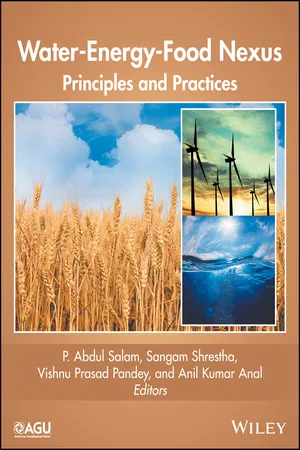
Water-Energy-Food Nexus
Principles and Practices
- English
- ePUB (mobile friendly)
- Available on iOS & Android
Water-Energy-Food Nexus
Principles and Practices
About This Book
Water, energy and food are key resources to sustain life, and are the fundamental to national, regional and global economies. These three resources are interlinked in multiple ways, and the term "nexus" captures the interconnections. The nexus has been discussed, debated, researched, and advocated widely but the focus is often on the pairings of "water-energy" or "water-food" or "energy-food". To really benefit from the nexus approach in terms of resource use efficiency it is essential to understand, operationalize and practice the nexus of all three resources. As demand for these resources increases worldwide, using them sustainability is a critical concern for scientists and citizens, governments and policy makers.
Volume highlights include:
- Contributions to the global debate on water-energy-food nexus
- Examples of the nexus approach in practice from different regions of the world
- Perspectives on the future of the nexus agenda
Water-Energy-Food Nexus: Theories and Practices is a valuable resource for students, research scholars and professionals in academic institutions with strong interests in interdisciplinary research involving geography, earth science, environmental science, environmental management, sustainability science, international development, and ecological economics. The volume will also be useful for professionals, practitioners and consultants in /NGOs, government, and international agencies. Read an interview with the editors to find out more:
https://eos.org/editors-vox/working-towards-a-sustainable-future
Frequently asked questions
Information
Section III
Nexus in Practice
12
The Water‐Energy‐Food Nexus from a South African Perspective
ABSTRACT
This chapter has brought a few case studies from South Asia and showcased the linkages that exist between energy, water, and food in the rural areas. The case studies show how the provisioning of energy leads to assured water availability and better agricultural productivity and food security. Further the chapter discusses where the linkages lie and how the establishment of such linkages helps in transforming the landscape of villages and leads to a sustainable future.
12.1. INTRODUCTION
12.2. WEF NEXUS PERSPECTIVE IN EXISTING POLICY FRAMEWORKS
- Every person has the right to
- an environment that is not harmful to their health or well‐being
- have the environment protected, for the benefit of present and future generations through reasonable legislative and other measures
- sufficient food and water
- Environmental protection measures should
- prevent pollution and ecological degradation
- promote conservation
- secure ecologically sustainable development and the use of natural resources while promoting justifiable economic and social development
Table of contents
- Cover
- Title Page
- Table of Contents
- CONTRIBUTORS
- PREFACE
- ACRONYMS AND ABBREVIATIONS
- Section I: Understanding the Nexus
- Section II: Operationalizing the Nexus
- Section III: Nexus in Practice
- Section IV: Future of the Nexus Agenda
- Index
- End User License Agreement